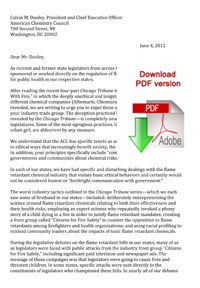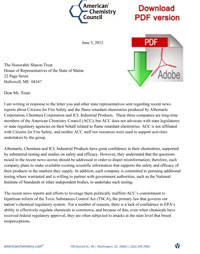Advertisement
Grab your lab coat. Let's get started
Welcome!
Welcome!
Create an account below to get 6 C&EN articles per month, receive newsletters and more - all free.
It seems this is your first time logging in online. Please enter the following information to continue.
As an ACS member you automatically get access to this site. All we need is few more details to create your reading experience.
Not you? Sign in with a different account.
Not you? Sign in with a different account.
ERROR 1
ERROR 1
ERROR 2
ERROR 2
ERROR 2
ERROR 2
ERROR 2
Password and Confirm password must match.
If you have an ACS member number, please enter it here so we can link this account to your membership. (optional)
ERROR 2
ACS values your privacy. By submitting your information, you are gaining access to C&EN and subscribing to our weekly newsletter. We use the information you provide to make your reading experience better, and we will never sell your data to third party members.
Policy
Legislators Urge ACC To Expel Firms
Chemicals: Allegations of inaccurate data and false testimony on flame retardants prompt uproar
by Jeff Johnson
June 11, 2012
| A version of this story appeared in
Volume 90, Issue 24

Twenty-one state legislators from 10 states are urging the American Chemistry Council, a chemical industry trade association, to expel three member companies for unethical behavior. As ACC members, the companies—Albemarle, Chemtura, and ICL Industrial Products—must conform to ACC’s Responsible Care program, which, according to a June 4 letter to ACC from the legislators, the companies do not.
The three firms are the world’s primary manufacturers of brominated flame retardants, and for decades they have faced efforts to limit use of retardants in furniture, electronic components, and other consumer goods. Pointing to a recent four-part series of articles in the Chicago Tribune, the legislators charge the companies with using “dirty and deceptive” practices to overcome state legislative efforts to cut use of flame retardants in consumer products.
In response, ACC says Responsible Care “is primarily an industry performance measurement and reporting initiative,” requiring members to publicly report metric-based performance.
In a June 5 letter to the legislators, Calvin M. Dooley, ACC president and CEO, distanced the organization from the actions of the three firms, but he acknowledged they are members.
According to the Tribune, the companies conducted a nefarious campaign to promote their products, including creating a phony grassroots organization, “Citizens for Fire Safety,” to attack state legislators who were pushing bills to limit use of the retardants. The companies, according to the articles, also scientifically supported use of the retardants by relying on a small number of obscure and ineffective tests and providing a dishonest medical doctor to testify against state bills. The doctor acknowledged to the Tribune that he had fabricated stories of several children’s deaths, claiming they died in fires when the children, in fact, did not exist.
Dooley stressed that ACC does not advocate with state legislatures on flame-retardant chemicals, nor is it affiliated with Citizens for Fire Safety.
Dooley said that each of the three companies recognizes the need to “dispel misinformation” in the news articles. The three will make scientific information available to support product efficacy and safety and will pursue additional testing “where warranted,” he said.
Along with their letter, the 21 legislators described actions taken against them by chemical firms. Maryland Delegate James W. Hubbard (D) said chemical companies sent mailers to his constituents, targeting him as a sponsor of a bill to restrict flame retardants and suggesting that the legislation would “allow people’s homes to burn down.”
The fight over brominated fire retardants in part reflects a stalled effort to reform the 1976 Toxic Substances Control Act. With little national movement, some dozen states have considered limits on flame retardants, pointing to growing evidence of the compounds’ potential to bioaccumulate and their links to cancer, neurological deficits, and developmental problems.






Join the conversation
Contact the reporter
Submit a Letter to the Editor for publication
Engage with us on Twitter